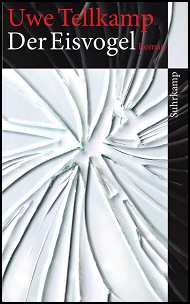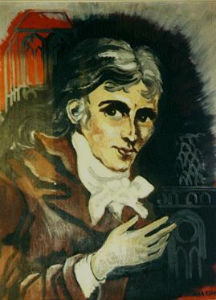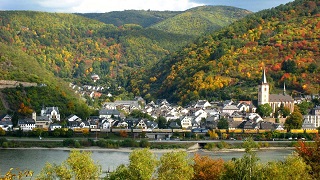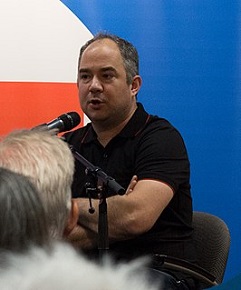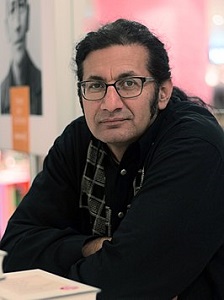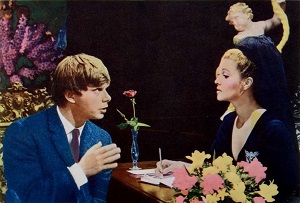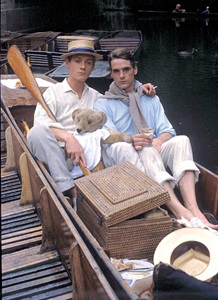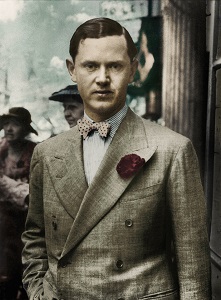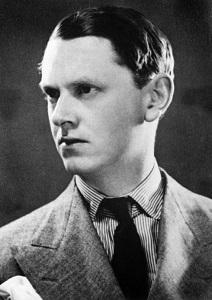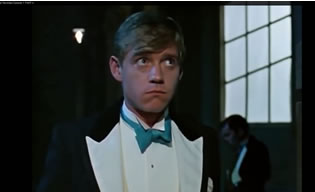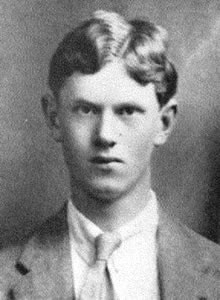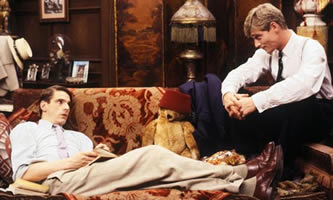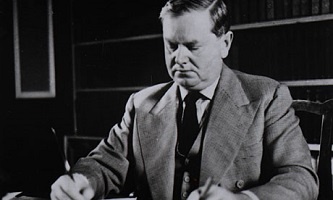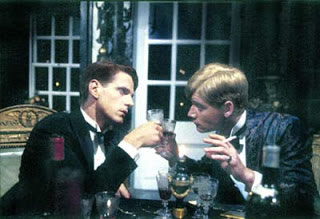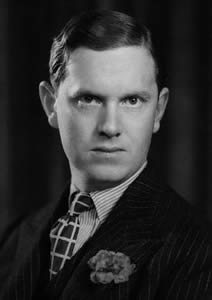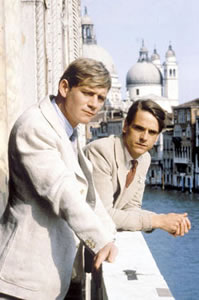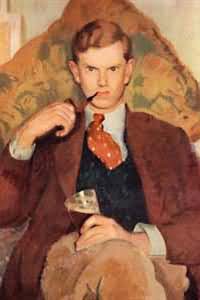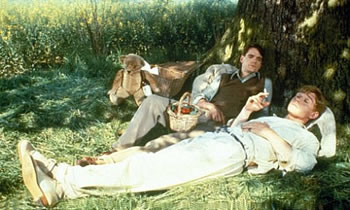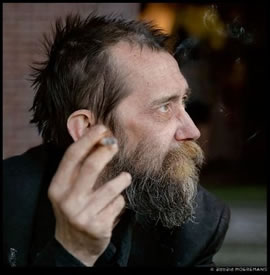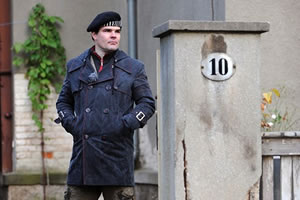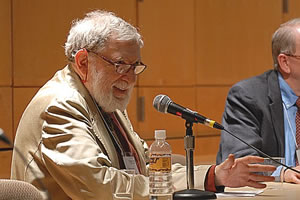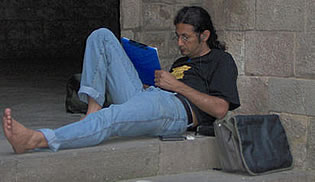De Britse schrijver Evelyn Waugh werd geboren in Londen op 28 oktober 1903. Zie ook mijn blog van 28 oktober 2006 en ook mijn blog van 28 oktober 2007 en ook mijn blog van 28 oktober 2008.
Uit: Decline And Fall
“So you’re the Doctor’s hired assassin, eh? Well, I hope you keep a firm hand on my toad of a son. How’s he doin’?”
“Quite well,” said Paul.
“Nonsense!” said Lady Circumference. “The boy’s a dunderhead. If he wasn’t he wouldnt’ be here. He wants beatin’ and hittin’ and knockin’ about generally, and then he’ll be no good. That grass is shockin’ bad on the terrace, Doctor; you ought to sand it down and resow it, but you’ll have to take that cedar down if you ever want it to grow properly at the side. I hate cuttin’ down a tree – like losin’ a tooth – but you have to choose, tree or grass; you can’t keep ‘em both. What d’you pay your head man?”
As she was talking Lord Circumference emerged from the shadows and shook Paul’s hand. He had a long fair moustache and large watery eyes which reminded Paul a little of Mr. Prendergast.
“How do you do?” he said.
“How do you do?” said Paul.
“Fond of sport, eh?” he said. “I mean these sort of sports?”
“Oh, yes,” said Paul. “I think they’re so good for the boys.”
“Do you? Do you think that?” said Lord Circumference very earnestly; “do you think they’re good for the boys?”
“Yes,” said Paul; “don’t you?”
“Me? Yes, oh, yes. I think so, too. Very good for the boys.”
“So useful in case of a war or anything,” said Paul.
“D’you think so? D’you really and truly think so? That there is going to be another war, I mean?”
“Yes, I’m sure of it; aren’t you?”
“Yes, of course, I’m sure of it too. And that awful bread, and people coming on to one’s own land and telling one what one’s to do with one’s own butter and milk, and commandeering one’s horses! Oh, yes, all over again! My wife shot her hunters rather than let them go to the army. And girl’s in breeches on all the farms! All over again! Who do you think it will be this time?”
“The Americans,” said Paul stoutly.
“No, indeed, I hope not. We had German prisoners on two of the farms. That wasn’t so bad, but if they start putting Americans on my land, I’ll just refuse to stand it. My daughter brought an American down to luncheon the other day, and, do you know …?”
“Dig it and dung it,” said Lady Circumference. “Only it’s got to be dug deep, mind. Now how did your calceolarias do last year?”
“I really have no idea,” said the Doctor. “Flossie, how did our calceolarias do?”
“Lovely,” said Flossie.
“I don’t believe a word of it,” said Lady Circumference. “Nobody’s calceolarias did well last year.”
“Shall we adjourn to the playing fields?” said the Doctor. “I expect they are all waiting for us.”
Talking cheerfully, the party crossed the hall and went down the steps.
“Your drive’s awful wet,” said Lady Circumference. “I expect there’s a blocked pipe somewhere. Sure it ain’t sewage?”
“I was never any use at short distances,” Lord Circumference was saying. “I was always a slow starter, but I was once eighteenth in the Crick at Rugby. We didn’t take sports so seriously at the ‘Varsity when I was up; everybody rode. What college were you at?”
“Scone.”
“Scone, were you? Ever come across a young nephew of my wife’s called Alastair Digby-Vaine-Trumpington?”

Evelyn Waugh (28 oktober 1903 – 10 april 1966)
De Vlaamse schrijver JMH Berckmans (Jean-Marie Henri) werd geboren in Leopoldsburg op 28 oktober 1953. Zie ook mijn blog van 28 oktober 2008.
Uit: Uit ogen die huilen van misprijzen
“Zo komt het dat ze weer allemaal samen voor de zoveelste keer aan de kersttafel zitten in de living van de benedenverdieping van het huis aan het nummer 21 in de Valaarstraat in Wilrijk. Bij Greta en Jean. Zoals elk jaar op kerstavond. Elk jaar op kerstavond nodigen Greta en Jean de hele familie uit.
De vader en de moeder, Gust en Marie-Louise.
De gaskamerman en de gaskamervrouw. De gaskamerman z’n haar hangt in lange vuile vieze klitten tot in z’n nek te hangen en de gulp van zijn jeans staat wagewijd open. Hij heeft niet eens de moeite genomen om in bad te gaan. De gaskamervrouw heeft haar nieuwe bloemenjurk aangetrokken. Ze denkt: Als de gaskamerman nu maar niet begint te zuipen.
En Inge. Voor de eerste keer zonder Peter. Peter heeft ze dit jaar eindelijk aan de deur gezet. ’t Is te zeggen: Inge is alleen gaan wonen. Op een klein appartement in de Coebergerstraat. Niks bijzonders maar goed genoeg. Klein maar proper. In maart komt de zaak nog één keer voor en dan is ze uit de echt gescheiden, zoals haar advokaat dat noemt. Definitief van die zak verlost. Tom en Bartje heeft ze meegenomen. En de auto ook, de Carina II. Die heeft ze nodig om naar haar werk te rijden. Ze is pas van werk veranderd. Ze werkt nu bij de Russen op het Falconplein en ze verdient er tienduizend frank meer dan bij De Rijck. Tien zakken, zegt ze.
En Guido en Cathy zijn er dit jaar ook bij. Guido voor de eerste keer. Niet dat Cathy aan die Guido een zaak gedaan heeft. Dat vindt iedereen, behalve Cathy. Geen schop onder z’n kont is die Guido waard. Dat vindt alleman, behalve Guido. Die vindt zichzelf een hele Piet. Piet Snot, denkt de gaskamerman. In Den Blokker op het Rooseveltplein staat die Guido achter de tapkast. Dat drugkot. Z’n zevenentwintigste baantje of daaromtrent. In een jaar. En als hij niet uitkijkt en voortmaakt sodemieteren ze ‘r ‘em daar ook binnen de kortste keren weer uit.
En de kinderen zijn er natuurlijk ook weer bij, die zitten aan de keukentafel die Jean bij de uitgetrokken eetkamertafel geschoven heeft: Isabelle en Stefan en Frédéric en Tom en Bartje, het kleine grut.
En tenslotte de honden, Carmen en José van Greta en Jean, de bobtail en de Mechelaar, en de kleine Prins, die de moeder van thuis heeft meegebracht omdat ze hem niet alleen wil laten op Kerstavond en die op de schoot van de moeder zit en haar gezicht schoonlikt.
Ze zijn er allemaal. Allemaal in die living van vijf bij zes waarin verder nog een wandkast, een tweede wandkast, een hele salon, een theetafeltje en een
uit z’n voegen gebarsten kerstboom vol glimmende bollen en flikkerende lampionnetjes. Want zonder kerstboom geen Kerstmis.”

JMH Berckmans (28 oktober 1953 – 31 augustus 2008)
De Duitse schrijver Uwe Tellkamp werd geboren op 28 oktober 1968 in Dresden.Zie ook mijn blog van 14 oktober 2008 en ook ook mijn blog van 28 oktober 2008.
Uit: Der Turm
„Die elektrischen Zitronen aus dem VEB »Narva«, mit denen der Baum dekoriert war, hatten einen Defekt, flackerten ackerten hin und wieder auf und löschten die elbabwärts liegende Silhouette Dresdens. Christian zog die feucht gewordenen, an den wollenen Innenseiten mit Eiskügelchen bedeckten Fäustlinge aus und rieb die vor Kälte fast taub gewordenen Finger rasch gegeneinander, hauchte sie an – der Atem verging als Nebelstreif vor dem finster liegenden, in den Fels gehauenen Eingang des Buchensteigs, der hinauf zu Arbogasts Instituten führte. Die Häuser der Schillerstraße verloren sich im Dunkel; vom nächstgelegenen, einem Fachwerkhaus mit verriegelten Fensterläden, lief eine Stromleitung ins Geäst einer der Buchen über dem Felsdurchgang, ein Adventsstern brannte dort, hell und reglos. Christian, der über das Blaue Wunder und den Körnerplatz gekommen war, ging weiter stadtauswärts, in Richtung Grundstraße, und erreichte bald die Standseilbahn. Vor den Schaufenstern der Geschäfte, an denen er vorüberging – ein Bäcker, Molkereiwaren, ein Fischladen –, waren die Rolläden herabgelassen; düster und mit aschigen Konturen, halb schon in Schatten, lagen die Häuser. Es schien ihm, als ob sie sich aneinanderdrängten, Schutz beieinander suchten vor etwas Unbestimmtem, noch nicht Ergründbarem, das vielleicht aufgleiten würde aus der Dunkelheit – wie der Eismond aufgeglitten war über der Elbe vorhin, als Christian auf der menschenleeren Brücke stehengeblieben war und auf den Fluß geblickt hatte, den dicken, von seiner Mutter gestrickten Wollschal über Ohren und Wangen gezogen gegen den frostscharfen Wind. Der Mond war langsam gestiegen und hatte sich von der kaltträgen, wie flüssige Erde wirkenden Masse des Stroms gelöst, um allein über den Wiesen mit ihren in Nebelgespinste gehüllten Weiden, dem Bootshaus auf der Altstädter Elbseite zu stehen, den gegen Pillnitz zu sich verlierenden Höhenzügen. Von einem Kirchturm in der Ferne schlug es vier, was Christian wunderte.
Er ging den Weg zur Standseilbahn hinauf, stellte seine Reisetasche auf die verwitterte Bank vor dem Gatter, das den Bahnsteig abschloß, und wartete, die Hände samt Handschuhen in die Taschen seiner militärgrünen Parka gesteckt. Die Zeiger der Bahnhofsuhr über dem Schaffnerhäuschen schienen sehr langsam vorzurücken. Außer ihm wartete niemand auf die Standseilbahn, und um sich die Zeit zu vertreiben, musterte er die Anzeigentafeln. Lange waren sie nicht mehr gesäubert worden. Eine warb für das Café Toscana auf der Altstädter Elbseite, eine für das weiter in Richtung Schillerplatz liegende Geschäft Nähter, eine andere für das Restaurant Sibyllenhof an der Bergstation.“
Uwe Tellkamp (Dresden, 28 oktober 1968)
De Amerikaanse dichter en criticus John Hollander werd geboren op 28 oktober 1929 in New York. Sinds 2007 is hij emeritis hoogleraar voor Engels van Yale University. Hij doceerde ook aan het Connecticut College, het Hunter College, en het Graduate Center, CUNY. Hollander’s eerste dichtbundel A Crackling of Thorns, trok de aandacht van W. H. Auden, die het uitkoos voor publicatie in de Yale Series of Younger Poets in 1958
The Night Mirror
What it showed was always the same—
A vertical panel with him in it,
Being a horrible bit of movement
At the edge of knowledge, overhanging
The canyons of nightmare. And when the last
Glimpse was enough—his grandmother,
Say, with a blood-red face, rising
From her Windsor chair in the warm lamplight
To tell him something—he would scramble up,
Waiting to hear himself shrieking, and gain
The ledge of the world, his bed, lit by
The pale rectangle of window, eclipsed
By a dark shape, but a shape that moved
And saw and knew and mistook its reflection
In the tall panel on the closet door
For itself. The silver corona of moonlight
That gloried his glimpsed head was enough
To send him back into silences (choosing
Fear in those chasms below), to reject
Freedom of wakeful seeing, believing
And feeling, for peace and the bondage of horrors
Welling up only from deep within
That dark planet head, spinning beyond
The rim of the night mirror’s range, huge
And cold, on the pillow’s dark side.
An Old-Fashioned Song
No more walks in the wood:
The trees have all been cut
Down, and where once they stood
Not even a wagon rut
Appears along the path
Low brush is taking over.
No more walks in the wood;
This is the aftermath
Of afternoons in the clover
Fields where we once made love
Then wandered home together
Where the trees arched above,
Where we made our own weather
When branches were the sky.
Now they are gone for good,
And you, for ill, and I
Am only a passer-by.
We and the trees and the way
Back from the fields of play
Lasted as long as we could.
No more walks in the wood.
John Hollander (New York, 28 oktober 1929)
De Duitse dichter, schrijver en theoloog Johannes Daniel Falk werd geboren op 28 oktober 1768 in Danzig. Zie ook mijn blog van 28 oktober 2008.
Das Lebenseinmaleins
nach einer bekannten Melodie
Mit EINS da fängt das Leben an;
Mit ZWEY da wird man Frau und Mann;
Und kommen wir erst zu den DREYN:
Da fangen Kinder an zu schrey’n.
Wo DREY sind, folgt alsbald die VIER;
Stets enger wird nun das Quartier;
Bey FÜNF und SECHS giebt’s größre Noth:
Denn immer kleiner wird das Brod.
Wohl Mancher rief bey SIEBEN schon:
O weh mir armen Korydon!
So wächst die Zahl von Jahr zu Jahr,
Bis grau vor Alter wird das Haar.
Sie wandern ein – wir wandern aus,
Heut Eins, und Morgen wieder Eins:
Das ist das Lebenseinmaleins!
Johannes Daniel Falk (28 oktober 1768 – 14 februari 1826)
De Duitse dichter en schrijver Karl Philipp Conz werd geboren op 28 oktober 1762 in Lorch. Zie ook mijn blog van 28 oktober 2008.
Die Finnenhochzeit
In König Sumblus Hallen erhub sich Freudenspiel,
es saßen da der Recken und edlen Degen viel,
der König in der Krone mit Edelstein geschmückt;
bei ihm die schöne Tochter in Brautschmuck man erblickt.
Zur Hand der Vogt von Sachsen als Bräutigam ihr saß.
Ei, was da nicht von Freuden und Lust ein Übermaß!
Es strömt in goldnen Schalen der purpurrote Wein, –
all Sorg und trübe Schwere, sie müssen vergessen sein.
Da tritt herein ein Harfner, gar wunderseltsam gestaltet,
vermummt, mit grauendem Barte und Rock und Mantel veraltet:
“Willkommen zu hohen Freuden, willkommen schöne Maid!
Willkommen, Herr König in Trauer! Willkomm, Herr Bräut’gam zu Leid!”
“Was, Leid im Freudensaale? Du wunderlicher Gast!
setz dich, und wen du getrunken und satt gegessen dich hast,
so freu dich mit den Freudigen und nimm das Wort zurück!
Wo nicht, so eile, du Schlimmer, von hinnen im Augenblick!”
So Sumblus zu dem Gaste. Gar seltsam tritt’s ihn an.
der Gast: “Was ihr euch freuet, ist nur alles ein Wahn;
was oft mir Freude begonnen, ist bald in Leid zerstoben.
Man soll, hört ich oft sagen, den Tag vorm Abend nicht loben!”
“Wie, bist du krank an Sinnen, und doch ein Harfner gut?
Wie, bannt dir nicht die Harfe der Sorge schweren Mut?
Auf, greife zu den Saiten! laß frisch ein Lied uns hören!
ein neues Lied, ein munteres Lied! so wollen wir baß dich ehren!”
Rasch schlug er in die Saiten, er sang von einer Braut,
die einem edlen König ein König hätt’ getraut
und hätt’ sie ihm gesichert fest in die rechte Hand
und dann in falschen Treuen den Sinn schnell abgewandt.
“O wer auf Weibertreue und Männerschwüre baut,
dem Sande und dem Wasser der seinen Fuß vertraut!
Ich mochte nimmer zagen mit flammenheißem Mut
vor Lanzen und vor Pfeilen, vor Schwertern rot von Blut.
Acht übermute Recken warf hin mein Schwert zumal,
neun streckte meine Lanze voll wilden Grimms zu Tal:
und soll jetzt so gehöhnet vor Braut und Rittern steht
und einem fremden Bräutigam vermählt die meine sehn?
O du viel falscher Vater, o du viel falsche Braut!
O du viel falscher Bräutigam!” so schrie er wild und laut.
Den König kam ein Zagen, die Braut ein Zittern an,
als mit gezücktem Schwerte mit eins den Harfner sie sahn.
Weg warf er Bart und Larve, enthüllte sein Gesicht:
Gorm war’s, der alte König, entflammt von Zornes Licht;
und alle die Recken im Saale, die fuhren erschrocken auf,
als auf den Vogt von Sachsen er fuhr in grimmigem Lauf.
Und eh sie sich mochten besinnen, lag Heinz schon tot im Blut.
“Da liegst nun, Ungesunder, und feire die Hochzeit gut!”
Und rasch die Braut aus dem Saale er aufhub löwenstark
und fort vom Finnenfeste sie führte nach Dänemark.

Karl Philipp Conz (28 oktober 1762 – 20 juni 1827)
